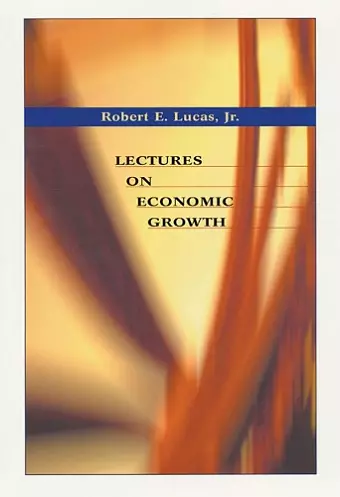Lectures on Economic Growth
Format:Paperback
Publisher:Harvard University Press
Published:1st Oct '04
Currently unavailable, our supplier has not provided us a restock date

Lucas writes beautifully and provocatively. He has thought hard about the forces of growth and the facts and episodes that must be explained by any growth theory. His discussion of history is interesting and insightful. It more than adequately motivates his theoretical modeling. And Lucas has few peers as a modeler; his models are parsimonious, his exposition is crisp, and he is very good at explaining what lessons should be drawn from the formal results. -- Gene M. Grossman, Jacob Viner Professor of International Economics, Princeton University
In this book the Nobel Prize-winning economist Robert Lucas collects his writings on economic growth, from his seminal On the Mechanics of Economic Development to his previously unpublished 1997 Kuznets Lectures.
In this book the Nobel Prize-winning economist Robert Lucas collects his writings on economic growth, from his seminal On the Mechanics of Economic Development to his previously unpublished 1997 Kuznets Lectures.
The chapters progress from a general theory of how growth could be sustained and why growth rates might differ in different countries, to a model of exceptional growth in certain countries in the twentieth century, to an account of the take-off of growth in the Industrial Revolution, and finally to a prediction about patterns of growth in this new century. The framework in all the chapters is a model with accumulation of both physical and human capital, with emphasis on the external benefits of human capital through diffusion of new knowledge or on-the-job learning, often stimulated by trade. The Kuznets Lectures consider the interaction of human capital growth and the demographic transition in the early stages of industrialization. In the final chapter, Lucas uses a diffusion model to illustrate the possibility that the vast intersociety income inequality created in the course of the Industrial Revolution may have already reached its peak, and that income differences will decline in this century.
Lucas writes beautifully and provocatively. He has thought hard about the forces of growth and the facts and episodes that must be explained by any growth theory. His discussion of history is interesting and insightful. It more than adequately motivates his theoretical modeling. And Lucas has few peers as a modeler; his models are parsimonious, his exposition is crisp, and he is very good at explaining what lessons should be drawn from the formal results. -- Gene M. Grossman, Jacob Viner Professor of International Economics, Princeton University
Robert Lucas is the most outstanding economic theorist of the late 20th century...The great merit of Lucas's models is that while they are mathematically rigorous, they are also very simple and transparent...As he takes up complications such as class, he still manages to derive elegant and lucid solutions...Lucas has now given a deeper meaning to new classical economics. This is a superb collection and will guide teaching as well as research for many years to come, as so much of Lucas's work already has done. -- Meghnad Desai * Times Higher Education Supplement *
Lucas provides a lucid introduction and nontechnical summaries of his main ideas...A reader may even come to feel the excitement of Lucas's passionate quest for the solution to the mystery of growth...[This] book is an outstanding intellectual achievement...Lucas's discussion raises the question of what kind of public policies are needed for countries to break out of poverty. -- Robert Skidelsky * New York Review of Books *
ISBN: 9780674016019
Dimensions: 227mm x 146mm x 13mm
Weight: unknown
224 pages